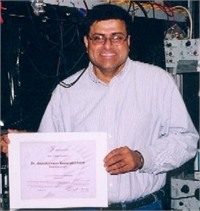Abstract: A single-state grating echo atom interferometer (AI) offers unique advantages for time-domain and frequency domain studies of light–matter interactions using dilute samples of laser-cooled atoms. This AI, which uses a single excitation laser, does not require velocity selection and is capable of operating on times scales limited by the transit time of cold atoms. Due to its reduced experimental complexity, this AI could offer an interesting alternative to widely used Raman Interferometers. We review applications of different configurations of the echo AI that utilize near-resonant excitation of lasercooled rubidium atoms for the precise measurements of atomic recoil, magnetic field gradients, and gravitational acceleration. Related coherent transient techniques that have achieved the most statistically precise measurements of atomic g-factor ratios are also outlined. We discuss the reduction of prominent systematic effects in these experiments using off-resonant excitation and increased atom-field coupling strengths.
Biography: Dr. A. Kumarakrishnan’s research group at York University focuses on industrial applications of auto-locked lasers and atom interferometric studies of laser-cooled atoms for precision measurements. His doctoral research at the University of Idaho investigated the properties of superfluorescent amplifiers with lidar applications in the mid-infrared wavelengths. During postdoctoral appointments at the University of Connecticut, New York University, and Massachusetts Institute of Technology, he was involved with studies of the properties of magneto-optical traps, and the development of single-state atom interferometers using cold atoms. He has also established industrial partnerships for pursuing research related to auto-locked lasers for applications in gravimetry, magnetometry, lidar transmission, optical free space communication, and the design of Faraday isolators. Dr. Kumarakrishnan has also developed two upper level laboratory courses on laser spectroscopy and atom trapping with industrial support. He was a visitor at the FOCUS Centre, University of Michigan, and his contributions to York University have been recognized through awards for graduate student mentorship and teaching.


